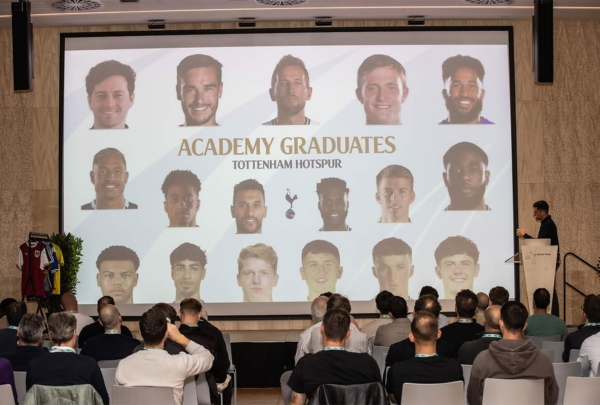
In the ever-competitive landscape of the Premier League, clubs are constantly refining their approaches at their academies. At our Talent Development Summit last year, we engaged with key figures from different clubs to discuss the current challenges and strategies that are shaping the future of youth development in football.
One message emerged from all the conversations: Successful academies are those that combine a personalized approach with an environment players genuinely believe in — and support that individualization with the right tools and structures.
Launched by the Premier League in 2012, the Elite Player Performance Plan (EPPP) is the national framework for youth development in English football. It aims to increase both the quantity and quality of home-grown players through clear standards of coaching, infrastructure and education.
Academies are categorized into four tiers based on their facilities, staff and program quality. While the EPPP has brought structure and accountability, it has also increased competition between clubs – not only in terms of recruitment, but also in how effectively they develop players to reach the next level. This makes individualization and environment key differentiators for each academy.
Darren Ryan, Head of Player Development at Wolverhampton Wanderers FC, described a significant shift over the past decade: “When I started, it was more generic and team-based. Now you have to look at the individual program.” This individualized approach also led to an increased need for staff at the club. “When I came to the club, we had a staff of 8 to 10 people for the academy, and now it’s over 100,” says Ryan.
At Southampton FC, Academy Manager Duncan Fearnhead emphasized the need to give players every advantage in terms of training opportunities: “We are trying to develop talent for the toughest league in the world. Every opportunity to improve their skills – whether technical, cognitive or physical – plays a huge role. And technology can play a huge part in that.” Personalized development paths ensure that each player can work on what he or she needs most to progress – something that team sessions alone can’t always provide.
This shift requires more staff, more planning — and smarter use of time and resources. It’s no longer just about offering individualized support, but about scaling it — across age groups, skill levels, and personalities. Many clubs are looking to data and technology to help manage that complexity without compromising quality.
In addition to training, the club environment plays a critical role in attracting and retaining talent — especially in a post-Brexit landscape where competition between clubs has intensified. “The biggest challenge is recruitment – getting the talent in the door,” said Fearnhead. So what is key to get a player you want? “Focus on creating a warm, welcoming environment where players feel settled. It’s not just about football—it’s about supporting them in every way, developing off-the-pitch skills and working closely with their families.”
Creating a positive and energizing atmosphere is also central to the Wolves’ philosophy. Ryan shared a simple but powerful metric: “When players come in, they always say how important the environment is. We’re competing with clubs like Aston Villa, Birmingham, West Brom, Derby, and Leicester, so we focus on creating a place they want to be. I tell the coaches: if you see players running into training, smiling and excited, then you know the environment is right.”
Realistic expectations and transparency with players and their families are also key components of today’s academy culture. As Wolves Academy Manager Jonathan Hunter-Barrett explained, “We don’t make false promises. What we can promise is quality development and honest conversations about how we’re going to make you better.” He emphasized that providing players with honest feedback, tailored training, and real opportunities for growth — rather than making promises — builds long-term trust and leads to better outcomes for both players and clubs.
Football players today are growing up in a digitally connected world – one in which they not only monitor their own performance, but can also constantly compare themselves to their peers. According to Alex Vinall, Lead Player Development & Methodology at Tottenham Hotspur, this has redefined the support young athletes need: “Players now have so much more access to different things. Everything is filmed, everything is online. They’re more aware of themselves and their colleagues than ever before.”
That increased awareness brings pressure. As a result, clubs are placing more emphasis on off-the-pitch support, ensuring that players have the psychological and emotional guidance they need to succeed – not just in football, but in life. At Spurs, the development process itself is also evolving. Vinall shared how they’re working on better ways to measure and evaluate their methods: “We’re designing a report to evaluate how well we’re performing against our methodology. It’s about getting into the real details and finding ways to quantify that.”
This balance between detailed performance analysis and holistic player development reflects a growing trend among top academies.
Player development in the Premier League is no longer just about building strong teams. It’s about developing strong individuals in an environment that challenges, supports and inspires them.
With the EPPP framework raising the bar and competition for young talent fiercer than ever, clubs are under pressure to deliver more — in less time. That means making individualization more efficient, more structured, and more measurable.
In this landscape, success belongs to those who invest in the individual — not just through people, but through systems that help players grow on and off the pitch, with the support of data, feedback, and football-specific tools.